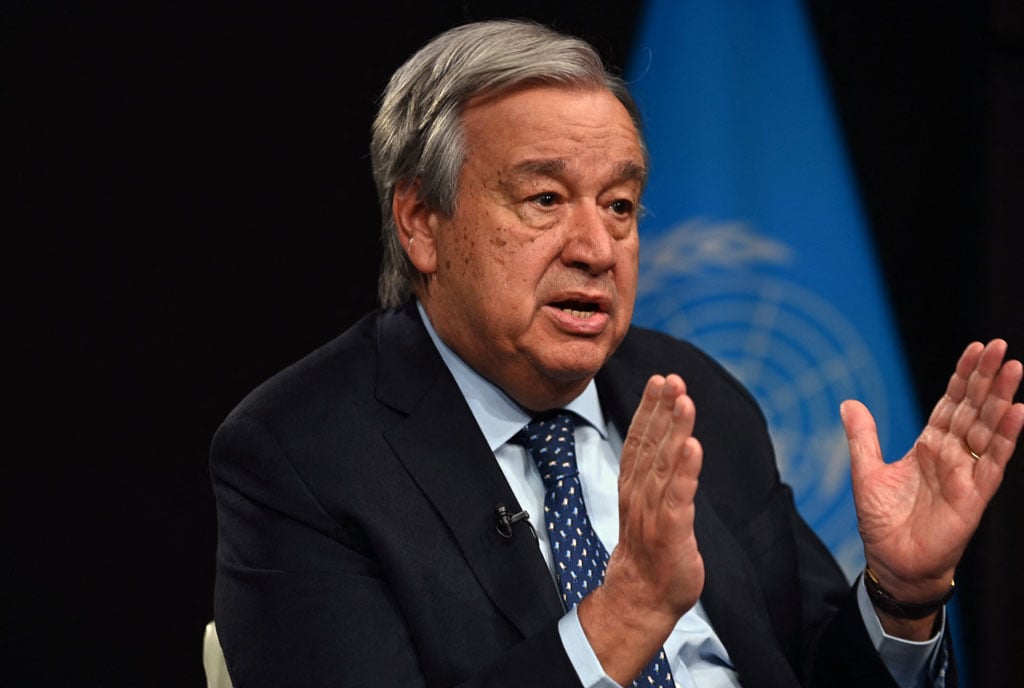Prime
COP28: Move to prioritise culture set to gather pace

UN Secretary-General Antonio Guterres speaks during an interview at the United Nations headquarters ahead of the COP28 meeting in New York, November 29, 2023. PHOTO/AFP
What you need to know:
- Natural heritage sites serve as vital “sinks” for greenhouse gas emissions, and are key for the protection of biodiversity.
The United Nations Educational, Scientific and Cultural Organisation (Unesco) has observed that climate change is one of the greatest threats facing culture today.
From increasing fires to floods, droughts, desertification and ocean acidification, World Heritage properties are suffering from the effects of climate change in every corner of the globe.
The uprooting of communities due to climate change threatens entire ways of life, including the practice and transmission of living heritage. Oral traditions, performing arts, social practices, festive events and traditional knowledge—including crucial knowledge about the environment—are all vulnerable in the face of climate change, the UN body adds.
It is on this basis that heritage organisations across the globe have united with the arts and creative sectors to launch a Global Call to Action, urging the UN Climate Change Convention (UNFCCC) to include culture in climate policy ahead of the forthcoming of the COP28 UN Climate Conference.
From the arts to heritage, culture has the power to help people imagine and realise low-carbon, just, climate resilient futures. Yet a persistent lack of recognition of this work in climate policy undermines the sector’s vital contribution and, ultimately, the effectiveness of global climate action itself.
The Call to Action aims to appeal for a ground-breaking ‘Joint Work on Culture and Climate Action’ decision at COP28, set to take place in Dubai from November 30 to December 12.
A Joint Work is a recognised process by which national governments can request the UN climate agency to jointly address a critical gap issue—in this case the intersections of culture and climate action. It would pave the way for the implementation of a landmark new UN work plan on culture, heritage, and climate action at next year’s UN Climate Conference (COP29).
The European Heritage Hub is leading the campaign in Europe. The draft Call to Action itself was launched and workshopped during the European Heritage Hub Forum ‘Reimagining the Anthropocene: Putting Culture and Heritage at the Heart of Climate,’ which took place in September in Venice, Italy.
The Secretary General of Europa Nostra and project leader of the Hub, Sneska Quaedvlieg-Mihailovic, said: “We have been ringing the alarm bell that heritage is in danger because of climate change, but we must be sure to recall heritage is also part of the solution.”
Letter of support
António Guterres, the UN secretary general, sent a letter of support to the Forum where he recognised the urgent need to harness culture and heritage in the fight for our planet.
“We can learn from indigenous peoples’ relationship with the planet, and from their traditional knowledge that can help us to reduce emissions and adapt to extreme weather. We can explore how culture contributes to climate change, and we can direct the power of culture, heritage and the arts towards inspiring social and political change that can help accelerate climate action,” he said.
Founding signatories of the Global Call include ICOM, ICOMOS, Climate Heritage Network, the National Trust for Canada, and the Cross-Cultural Foundation of Uganda (CCFU), among others.
“We have 100 founding signatories from six continents, reflecting international, multi-national, national, regional and local organisations, as well as individual thought leaders. But that was before the call was launched on November 9, and since then, 700 organisations and people have so far signed,” the CCFU Heritage Trust programme manager, Mr Simon Musasizi said.
When asked about the importance of including culture in climate policy, he said: “It will commit UNFCCC and its subsidiary technical bodies to begin a consultative process to understand the full contribution of culture—including cultural heritage, arts and the creative sectors—to climate action.”
He added: “The process will examine what culture-led climate responses are already happening, where and by whom; share recommendations for scaling out culture-based solutions; and help ensure that culture is fully integrated into the future work of the Convention.”
Importance of culture
According to Unesco, culture is a powerful resource for addressing climate change impacts. Natural heritage sites serve as vital “sinks” for greenhouse gas emissions, and are key for the protection of biodiversity.
Intangible cultural heritage practices have proven to be highly effective tools for helping communities prepare for, respond to, and recover from climate change-related impacts and emergencies.
This can include the transmission of traditional food security strategies and knowledge about changing weather patterns, as well as the use of traditional architecture that can withstand natural disasters, Unesco adds.
Cultural heritage sites can also serve as a refuge, both physical and psychological, for surrounding communities during and after emergencies. Creativity is essential for finding new solutions to environmental challenges.



